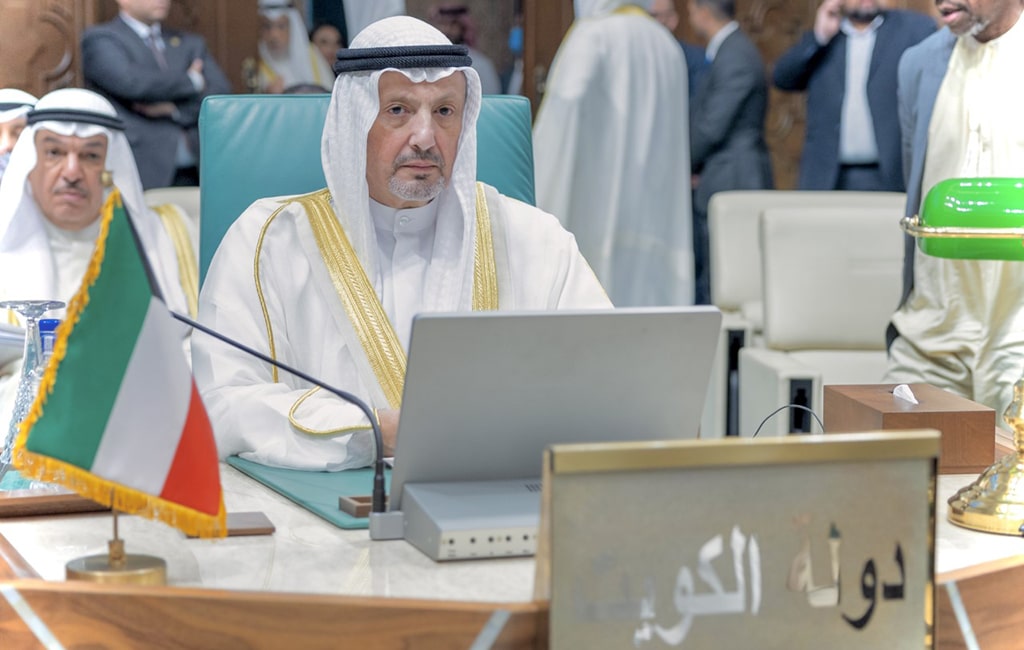CAIRO: Kuwaiti Foreign Minister Sheikh Salem Abdullah Al-Jaber Al-Sabah has denounced the Zionist occupation's systematic assaults on Palestinian people. "The Zionist occupation authorities continue their systematic aggression against the Palestinian people and increase their suffering," Minister Salem said at the 159th session of the Arab Foreign Ministers Council, held in Cairo on Wednesday. "We condemn and denounce the continued Zionist occupation's aggressive violations against the Palestinian people."
Sheikh Salem deplored the raid in the city of Jenin in the occupied West Bank which left six Palestinians dead and several others injured. He pointed out that such Zionist behavior is an obstacle to peace in the region. The Kuwaiti top diplomat also condemned the occupation authorities expansion in illegal settlement activities on the occupied Palestinian land. He renewed Kuwait's unwavering support to Palestinian people and their rights in face of the occupation authorities' unilateral measures that aims to change the historical status of the city of Jerusalem.
Sheikh Salem voiced Kuwait backing to the Palestinian people's choices and efforts to reach a just and comprehensive solution to their cause that guarantees the end of the occupation, the return of refugees and the establishment of a Palestinian independent state on the borders of June 4, 1967 with East Jerusalem as its capital in accordance with the UN resolutions, the Arab Peace Initiative, and the two-state solution. In this regard, the minister welcomed the positive outcome of the Jerusalem Conference held in February 2023.
On Yemen, Sheikh Salem Abdullah expressed Kuwait's deep concern over the Houthi militia's refusal to extend the UN-mediated ceasefire that ended in October 2022 and non-supportive stance to the efforts of the Special Envoy of the Secretary-General of the United Nations to Yemen.
This behavior risks complicate and prolong the crisis, the Kuwaiti minister warned, calling on all parties to engage in serious negotiations to reach a political solution that meets Yemeni people aspiration for security, stability and prosperity, in accordance with the three references, the Gulf initiative and its mechanism, the outcomes intra-Yemeni dialogue, and UN Security Council resolutions, including resolution N 2216. He called for meeting the humanitarian needs of Yemeni people and supporting Yemen's economy.
On Libya, the Kuwait top diplomat urged all concerned parties to give priority to the Libyan national interests and strive to reach a consensus on the political, security and constitutional requirements that lead to holding national elections. He commended the work of the Military Committee (5 + 5) and the efforts of the UN envoy to Libya Abdoulaye Bathily.
On Lebanon, the minister called on all Lebanese parties to abide by the constitutional provisions and deadlines, especially those related to the election of the president, in a way that guarantees the state's sovereignty, security and stability. He encouraged Lebanese officials to implement reforms necessary for economic recovery.
On Syria, Sheikh Salem extended condolences to the brotherly Syrian people following the earthquake that struck northern Syria last month. He reiterated that there was no military solution to this crisis and that the only solution was through a political settlement that preserves the unity and sovereignty of Syria and fulfills the aspirations of its people in accordance with the UN Security Council Resolution No 2254 and the Geneva Declaration.
The foreign minister asserted Kuwait's principled and firm position against military interventions in any conflict. Kuwait was deeply concerned about the developments of the Ukrainian crisis and its serious repercussions on international peace and security and its consequences on the humanitarian situation and the global economy and called for a peaceful solution based on the principles of international law and the Charter of the United Nations, he said.
He reminded that Arab countries were facing huge responsibilities and challenges that require more efforts, coordination and effective methods to overcome them. He called for cooperation among Arab countries to deal with the serious challenges such as terrorism and extremism, regional and international security, foreign interferences, threats to the freedom of navigation in international waters. - KUNA











